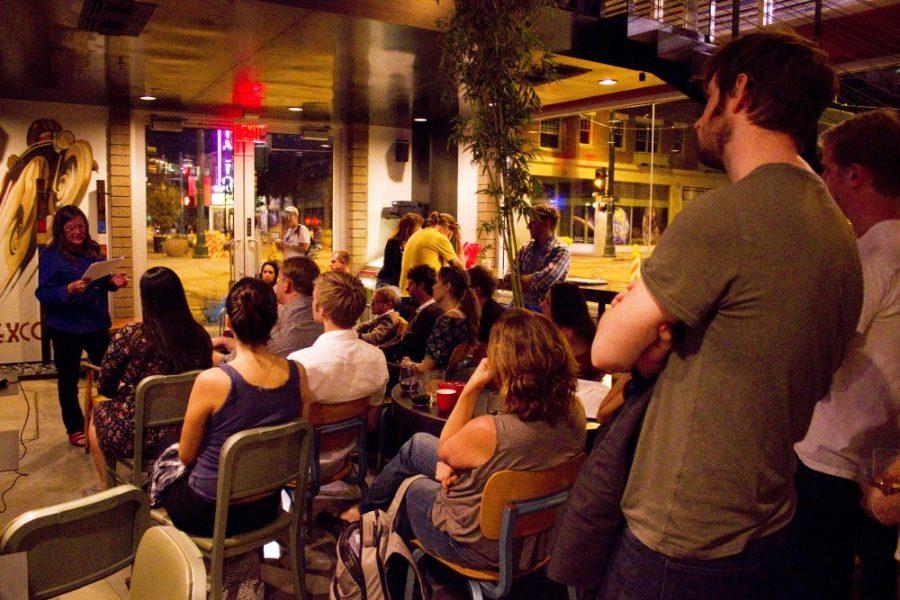On Oct. 1, Sonora Review kicked off the 30th Banned Books Week with Sonora Review’s Banned Book Reading at Sparkroot downtown. The reading featured works from Alison Hawthorne Deming and Philip Zimmerman (presented by Karen Zimmerman), followed by selective readings from banned books by Sonora Review staff.
Deming did her best to command the attention of the busy coffee shop by walking around and projecting her voice. She spoke a little bit about why she was reading, and about the furor that erupted in 1990 surrounding writer censorship. She informed the crowd of her inclusion on a hit list, for what she assumed was due to sexual content in her work. Over the din of pounded espresso grounds Deming read a new piece from her “Animal Book” hoping to “give a voice to the dispossessed and disenfranchised,” which she said she feels is key to the Banned Books movement.
The movement is an especially compelling topic in Tucson since the Tucson Mexican-American Studies program in the Tucson Unified School District was judged to be illegal last year. Hundreds of books from the MAS curriculum were boxed and moved out of classrooms. Included in the list of books taken from Tucson classrooms are Richard Delgado’s Critical Race Theory, Bill Bigelow’s “Rethinking Columbus: the Next 500 Years” and even “The Tempest” by Shakespeare.
In 2011, the American Library Association reported that 326 books were challenged. Included in the top ten list of challenged books for 2011 are the series ttyl by Lauren Myracle, The Hunger Games trilogy by Suzanne Collins, “My Mom’s Having A Baby! A Kid’s Month-by-Month Guide to Pregnancy” by Dori Hillestad Butler, “Brave New World” by Aldous Huxley, and “To Kill A Mockingbird” by Harper Lee. The lists are stunning. They are available to view on the American Library Association website.
Banned Books Week is an international event, but what are we doing in Tucson? On Oct. 5 at 8 p.m., in the UA’s Modern Language building auditorium (room 350) will hold a free and open to the public lecture called Liberating Literature: An Evening with Sandra Cisneros, Manel Muñoz, and Helena María Viramontes hosted by the College of Humanities and Department of English. The speakers will discuss how literature can be used as a tool to right cultural misunderstandings, and how access to new ideas can build and strengthen community bonds.
UA creative writing junior Samantha Campas has been working in the Pima County Library system for six years. She said that the library does events in support of Banned Books Week, adding, “It’s crucial to bring attention to banned books, because no information should ever be withheld based on a small opinion of disagreement. All info should be free and open — always.”
While Banned Book Week is about bringing attention to censorship and giving a productive space for those outraged, the event is also about celebrating the freedom we have to access information. It’s odd to think that the U.S. still bans and challenges books; most students don’t think about what they might not be able to read because of governmental intervention. It’s understandable, because many students aren’t exposed to the idea since challenged books still remain available for the public’s reading pleasure, and that is certainly something to celebrate.
People all over different social media sites are sharing what they’re reading in honor of Banned Books Week. Which book are you reading this week? Hashtag #bannedbooks and let us know jwwwood and wildcatarts
For more information about Banned Book Week, visit bannedbooksweek.org.
For more information about the UA’s lecture on Oct. 5, visit the Poetry Center’s website .
Follow us on Twitter @wildcatarts and follow Jeannie @jwwwood.









